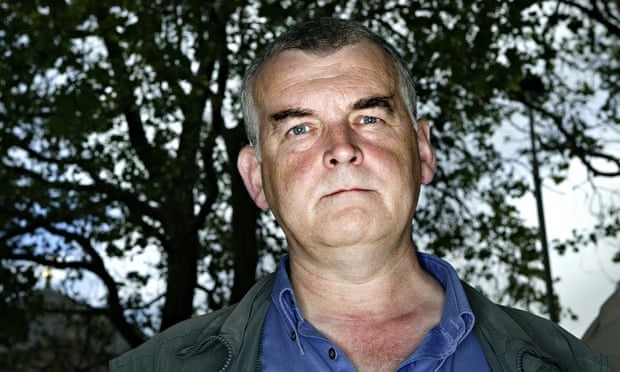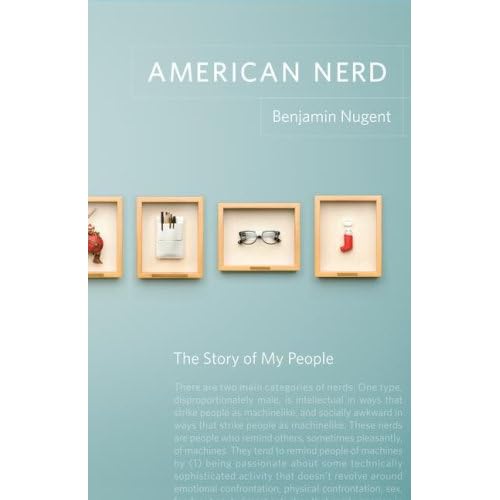Interview with Ken MacLeod about Iain M. Banks
/ Recently, I wrote about Iain M. Banks for Kirkus Reviews. In conducting the research for that post, I spoke with one of his friends, fellow SF author Ken MacLeod, who graciously agreed to answer my questions. Here's our interview.
Recently, I wrote about Iain M. Banks for Kirkus Reviews. In conducting the research for that post, I spoke with one of his friends, fellow SF author Ken MacLeod, who graciously agreed to answer my questions. Here's our interview.
Andrew Liptak: When did you first meet Iain Banks?
Ken MacLeod: At Greenock High School around about 1969 or 1970. He claimed we met when I approached him to write a story for the school magazine (a story the teachers who had the last word on what went in rejected as too sweary or too gory) but I have only the vaguest recollection of the incident.
AL: Were the two of you close friends throughout High School?
KM: Not exactly. I have to be a bit tedious and specific here. There are two towns adjacent to Greenock, which is a small town on the Firth of Clyde on the West coast of Scotland. Upriver is Port Glasgow, which is where most of the maritime industry used to be, and downriver is Gourock, which was originally a resort – back in the day when steamship excursions on the Clyde were the best holidays most people could afford. Over the years the towns basically merged at the edges. Anyway, Iain's family lived in Gourock, where his father worked for the Admiralty. Iain went to Gourock High School, which only catered for students up to their third year and the exams then known as O-levels. Anyone who wanted to do the next grade of exams, Highers, which were what you needed for university entrance, had to go to Greenock High School. So Iain arrived along with several other boys and girls in our fourth year. I was already part of a clique who thought they had deep thoughts and who were considered promising by our English teacher, Joan Woods. She encouraged us to form a creative writing group or something like that. Joan was a remarkable and much loved teacher who right from the start did innovative off-curriculum things like getting the first or second-year English class to analyse Simon and Garfunkel lyrics after listening to the album, and to study poems so new that they were literally only published as duplicated handbills. Years later I amused and surprised Brian McCabe by quoting a line or two one of his early poems from memory.
Anyway – the meetings of the writers' circle began in some public room but soon became evening gatherings in Joan Woods' living-room, and they continued even after the students involved had gone on to university. Several of us remained friends with Joan for many years afterwards. At some point in his high school years Iain became part of that clique, and we became closer friends when we were both at university – he at Stirling, I at Glasgow. We had an interest in SF in common and we used to meet on Saturdays when we were both home for the weekend, go out for long walks with our pals or go round to see Joan, who put up with our antics and gave us coffee and biscuits.
AL: Can you describe a bit about what he was like in person?
KM: He was cheerful, affable and sociable, but enjoyed solitude -- he sees to have done a lot of thinking while walking or driving. Very generous and loyal to his friends -- he made a lot of new friends in the course of his career, but remained close to the friends he already had from his schooldays, and to his family. He had remarkable equanimity -- in all the years I knew him I never saw him in a bad mood, or show more than a rare and momentary annoyance. He had a penchant for ordering and organising things: bookshelves and CDs and tools and so on, which I think went with how carefully he planned everything from his books to his schedule for the year. He had this focus and work ethic along with a capacity for recklessness, spontaneity and risk-taking -- which, now I come to think of it, was quite measured and calculated as well: he took care to endanger only himself, and he could now and then get hilariously drunk in company but never drank alone.
AL: To the best of your knowledge, how did he begin to write science fiction?
KM: The best person to ask is David Haddock, editor of the fanzine 'The Banksonian', even though I was there at the time and he wasn't. He's done the research, asked Iain questions and correlated reminiscences from interviews and so on.
You can find his talk outline on Iain's pre-publication writing here.
However, as far as I know Iain's first extended work of fiction that was actually typed and not handwritten was 'TTR' [The Tashkent Rambler] - a huge sprawling work set that wasn't SF but was set in the (then) near future. (In the interviews with Andrew J Wilson cited below, he says that it was inspired by Catch-22 and Stand on Zanzibar.) Then after a couple of abortive novels, one of which was SF, he wrote the first draft of 'Use of Weapons'.
AL: Where did he discover science fiction, and what about genre stories attracted him to them?
KM: Probably through TV series like Thunderbirds, Dr. Who and Star Trek, then SF books in the local libraries. Like every British SF writer of our generation, he'd mention seeking out the yellow-jacketed Gollancz SF books on library shelves. He read very widely in all kinds of fiction even in high school, and gravitated towards SF by I guess his mid-to-late teens - in his final year in high school he wrote a dissertation on SF, and it had sections on 'The Escapist Stuff', 'The Hard Core', and (though I can't swear to the title of this one) 'The New Wave'. He'd read all the standard Asimov and Clarke and Heinlein and then found the New Wave - Spinrad, Ballard, Keith Roberts, M. John Harrison - with Aldiss, I guess, as the bridging figure. The 'New Worlds Quarterly' paperback series was a big influence, both the stories and the criticism, mostly by Clute and Harrison.
AL: His first book was The Wasp Factory, a non-genre story: it's not often that we see genre authors writing outside of the genre to the same regular schedule as he did: why do both?
KM: He'd already written, sent in to publishers, and had serially rejected 'TTR', Use of Weapons, Against a Dark Background, The State of the Art, and The Player of Games. So he thought he'd try something mainstream and middle-of-the-road ... I remember him telling us he was writing a mainstream novel and sounding almost apologetic, as if we might think he was letting the side down. But I think he continued to write both literary fiction and SF because he could and also because the mainstream novels sold better.
AL: I remember reading somewhere that he wrote science fiction simply because he loved it.
KM: Yes, that seems about right. He would say he enjoyed it slightly more than writing non-genre fiction (which is a genre in itself, one he and I sometimes labelled 'LF', 'lit-fic', or 'lie-fi').
AL: Do you recall what his reaction was like when he finally sold Consider Phlebas? Was there a sense of relief?
KM: Glee, I seem to recall. He was very pleased to have an SF novel published at last, but I don't think he ever doubted he eventually would.
AL: What inspired his Culture novels and the world he built?
KM: The way he explained it was that he wanted to write about a morally and psychologically flawed mercenary fighting on the side of a genuinely good society, and so proceeded to work out what kind of society he himself would most like to live in. When he told me about this society I told him it was communism, in the sense of the Marxian vision of a society of abundance without classes, the state, or money. He came to agree but I don't think that influenced anything that went into the Culture: he just worked it all out from first principles. I've written about this here and here.
AL: I know there’s been a number of people who have pointed to his Ringworlds as being directly borrowed from Larry Niven’s novel Ringworld. Was there a sense of ‘let’s add in everything that’s cool’ to the Culture novels?
KM: No – look at all the trad space opera cool stuff he left out! He may well have been inspired by Ringworld, but he arrived at Rings by his own route. As far as I can recall he worked out Orbitals first – he figured out how big a rotating structure would have to be to have centrifugal force of one gravity on the inner surface and a 24-hour day, quickly realised that no known material could sustain it, and handwaved in force-fields to hold it together. If you can do that you can do Rings, so he threw them into the background but I don't think there's a story specifically set on a Ring.
AL: What did Banks hope to accomplish with the Culture: where there certain things he sought to cover and examine?
KM: His running gag was that he'd sought to capture the moral high ground of space opera for the Left. He wanted to write big-scale colourful adventures that were well written and weren't Social Darwinism Within that he explored particular topics -the themes are pretty much worn on the sleeve: there's an ongoing debate over the morality of outside intervention, for instance, and responsibility in general. But I think the themes kind of emerged from the settings and stories.
AL: What particular right-wing elements of space opera was he uncomfortable with?
KM: Basically the unimaginative projection of present-day societies into the far future, and the not exactly hidden endorsement this gives to aspects of these societies, such as imperialism and militarism as well as capitalism. He was just as sceptical of Asimov's more liberal version of that, taking suburbia to the stars. I seem to remember him saying that Dune – which he enjoyed and admired, though he derided the ending (he said something like "'History will call us wives' – come on, Frank, is that the best you can do?") was somehow absurd in postulating an interstellar humanity that wasn't just imperial but feudal. I replied that it wasn't really compatible with the materialist conception of history, which made us both laugh at such a mild and obvious demurral.
AL: Which of the Culture novels were his favorites?
KM: He always said Use of Weapons was his favourite – I think partly because it's a very strong book, but also because it's full of the joy of inventing not only the Culture but also the other worlds where the action is set, a joy that's itself shot through with his own youthful vigour and sense of discovery, and of making use of all the knowledge and experience he'd had up to that point. Beyond that it's hard to say. Look to Windward was one he was fond of, partly because of the intensity of its moral seriousness.
AL: He wrote several non-Culture SF novels. Why did he take the break in the 1990s?
KM: The break wasn't quite as big as it seems. We have to bear in mind that the sequence of writing wasn't the sequence of publication. Against a Dark Background was the second SF novel he wrote, though it was published fourth. After Consider Phlebas, he revised his three already-written and oft-rejected space operas. It may be just a matter of chance that the non-Culture one was the last of these. By this point he wanted to 'write something I could cut loose on, something that wasn't the Culture ... I'll go back to that in the next science fiction novel.' ('Lightly Seared on the Reality Grill: Conversations with Iain Menzies Banks', Andrew J Wilson, Foundation Vol 42, No 116, Winter 2012/2013, 2014). It's interesting that the next Culture novel, Excession, is a departure from all the earlier works in that the attention is much more on the Minds, we see them and other machines more often as viewpoint characters, and the Culture is brought bang up to date with nanotechnology and virtual reality and much more intimate interfaces between humans and machines than we see in the earlier work. But all that is adumbrated in Feersum Enjinn, which I think is his first real 1990s, post-cyberpunk SF novel.
AL: Did he have the same goals with those books as the Culture novels?
KM: There was the same moral sentiment, and the same exuberance of creation, but without the constraint of having to think 'Now, how would a truly good and immensely powerful society respond to this appalling situation?' Though of course one of the non-Culture novels, Transition, has in that respect a Culture analogue in the Concern.
AL: Why write outside of the series?
KM: He wanted to explore other possibilities – to set a novel with megastructures in it on Earth, in the case of Feersum Enjinn, or a universe full of aliens and empires in our own future, in The Algebraist. Also, quite simply, he came up with ideas that didn't fit the Culture universe and he didn't want to be locked into one series, however open-ended.
AL: What was the first thing from him that you read?
KM: A pun-filled parody spy-thriller-type adventure story hand-written in a school exercise book and illustrated with montages of pictures clipped from magazines, mostly Sunday colour supplements. (A technique inspired by Terry Gilliam's graphics from Monty Python, and possibly Private Eye covers and the alternative/underground press of the time.)
AL: Can you tell me a little about the Scottish SF circle? I know that there's a solid knot of authors from there.
KM: Well, it's more of a loose skein really - there are separate knots of fans and writers in Glasgow and in Edinburgh, and I don't know about any other local concentrations though they must exist. There's a very active fandom and writers' circle in Glasgow. In Edinburgh there is a loose circle around people who were members of the Edinburgh University SF/F society years ago, and the friends they've accumulated along the way, with Charles Stross and Andrew J Wilson as central figures. There's also an overlapping circle of writers who met through Andrew Greig, who used to live in South Queensferry and who I first met many years ago when he was writer in residence at Edinburgh University. I introduced him to Iain, and he introduced us to novelists and poets such as Ron Butlin, Regi Claire, Ian Rankin, the late Edwin Morgan, Brian McCabe, Lesley Glaister, all of whom became our friends too.
AL: Is there something about Scotland that sets you guys apart from the rest of the genre field, either politically, environmentally or otherwise?
KM: I think in most respects we're fairly typical of British SF writers. The famous Caledonian antisyzygy can be seen in my writing and in Iain's, but by and large you'd be hard put to distinguish Scottish SF from British SF as a whole. Besides - as I think it was Paul McAuley who said - there just aren't enough of us to be a statistically valid sample.
AL: Did Banks have plans for other Culture novels beyond Hydrogen Sonata? What might it have covered?
KM: He had an idea for a novel about a character who had stored some of his memories in ammunition, so every time he used his weapon he lost part of himself. He hoped to have left enough of an outline and notes for me to write something from if he didn't have enough time left to write it himself, but sadly his illness didn't even leave time for even an outline. It was a generous idea, and typical of Iain, in that he inisted he would like me to write the novel in my own way and not in a pastiche of his, but even so I think I would have found it almost impossible.
AL: What was his writing process like, and how did he construct The Culture as a world?
KM: He read widely, thought a lot, made page after page of notes of ideas, and then when the time came to write another book he would look through his notes, extract or otherwise come up with a story idea, write a detailed outline and then sit down for two or three months and bang the thing out at a rate of about five thousand words a day. He constructed the Culture initially with a lot of drawings of ships and orbitals, weapons and drones and so on, maps of locations, lists of names ... ship names and character names, which he had a real knack for inventing or finding. There's a minor character in Against a Dark Background called Elson Roa, the leader of gang of solipsist bandits, and after I'd read it in draft Iain showed me where he'd found it: a broken street sign for the street where he lived, Nelson Road.











